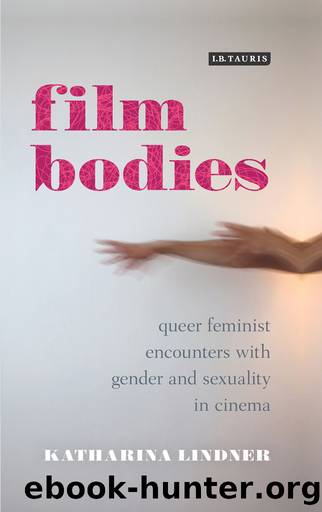Film Bodies by Lindner Katharina;

Author:Lindner, Katharina;
Language: eng
Format: epub
Publisher: Bloomsbury UK
Published: 2018-08-15T00:00:00+00:00
Towards a Queer Feminist Sports/Film Phenomenology
In keeping with the overarching aims of this book, I want to move, not necessarily beyond, but perhaps around, existing debates on sport and film (including those concerned with gender), and explore how the intersections between sport and cinema provide a space in which conventional and straightforward notions of temporality and spatiality, and the ways in which they tend to be tied to particular identity formations, can be, and are, challenged. A phenomenology of sport and the sporting body as developed by feminist and queer critics such as Iris Marion Young, Judith Butler and Jacqueline Allen-Collinson, accounts for the corporeal and affective dimensions of sport and athleticism.14 A (queer feminist) phenomenology of sport resonates, in some ways profoundly, with (queer feminist) film phenomenological concerns and I want to explore these resonances through an engagement with two very different, and in a sense atypical, sports films in 2 Seconds and Offside. Both films play with, and disrupt, the conventions that normally structure our (spectatorial) encounters with sport, and their disorientating tendencies are tied to the female protagonists who provide the grounds for variously twisted modes of spatiality and temporality to surface in and through the films.
2 Seconds is an independent Canadian production, variously described as a sports comedy/drama/romance. The film opens with Laurence, called Laurie (Charlotte Laurier), a professional downhill mountain-bike racer, losing a championship race and then her job â she is too old and just not good enough anymore. Not only does 2 Seconds begin with what would conventionally feature as the climactic final sporting competition, the protagonist also loses the race, a defeat without any redeeming features whatsoever, and things go downhill (in all senses) from there. However, despite Laurieâs sporting career coming to an end as the film opens, 2 Seconds is very much a film about cycling. It is the embedding of cycling in a non-competitive, non-sporting context, and in relation to an initially unemployed, single, ageing protagonist, that enables the film to evoke a sense of queerness that hinges, at least in part, on its unravelling of what Freeman calls âchrononormativityâ or âhomogenous empty timeâ and Halberstam refers to as âstraight timeâ.15 In a chapter aptly entitled âBad timingâ, Freeman explores how the disruption of straight(forward) time allows for the emergence of variously queer temporalities that can, and do, constitute points of resistance to normatively conventional temporal orders, organised as they are around generationality, genealogies of descent, (re)production and the mundane workings of everyday (public and domestic) life. Laurieâs continuous âqueer failureâ to incorporate the rhythms and directionality of normative temporal registers disrupts assumptions of the givenness of âstraight timeâ.16
Jafar Panahiâs Offside offers a very different, although equally twisted, encounter with sport, that hinges primarily on the disruption of a normative spatial order, although notions of immediacy and bad timing play an important affective, visceral role as well.17 Disorientation, spatial and otherwise, is articulated in and through Offside via its focus on a group of young women in Tehran who
Download
This site does not store any files on its server. We only index and link to content provided by other sites. Please contact the content providers to delete copyright contents if any and email us, we'll remove relevant links or contents immediately.
Call Me by Your Name by André Aciman(18965)
Ready Player One by Cline Ernest(12838)
How to Be a Bawse: A Guide to Conquering Life by Lilly Singh(6693)
Wiseguy by Nicholas Pileggi(4586)
The Kite Runner by Khaled Hosseini(4435)
On Writing A Memoir of the Craft by Stephen King(4213)
The Crown by Robert Lacey(4105)
Audition by Ryu Murakami(4099)
Call me by your name by Andre Aciman(4073)
Harry Potter and the Cursed Child: The Journey by Harry Potter Theatrical Productions(3964)
Gerald's Game by Stephen King(3918)
The Perils of Being Moderately Famous by Soha Ali Khan(3782)
Dialogue by Robert McKee(3582)
Dynamic Alignment Through Imagery by Eric Franklin(3489)
Apollo 8 by Jeffrey Kluger(3200)
How to be Champion: My Autobiography by Sarah Millican(3186)
Seriously... I'm Kidding by Ellen DeGeneres(3100)
Darker by E L James(3088)
History of Dance, 2E by Gayle Kassing(3000)
